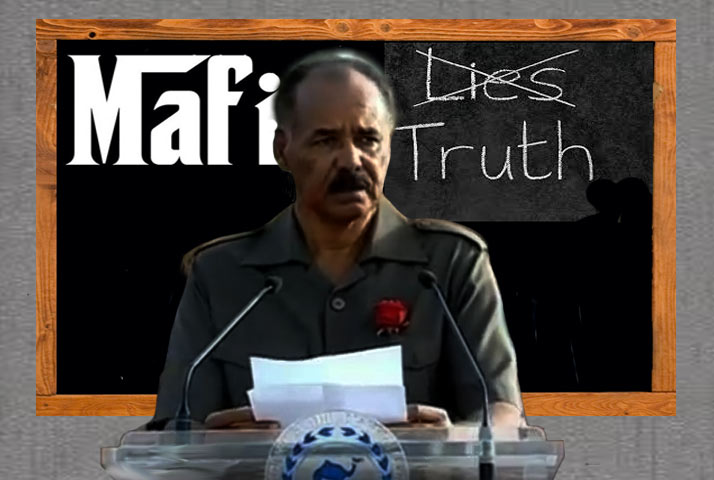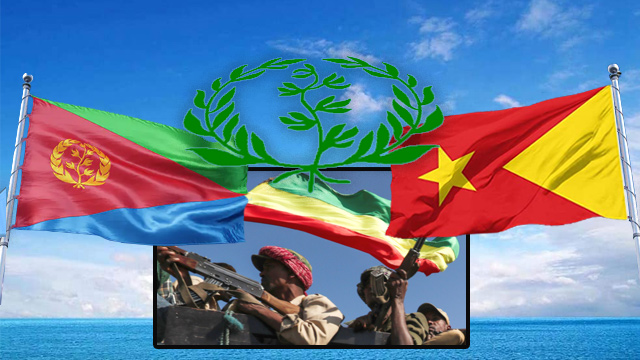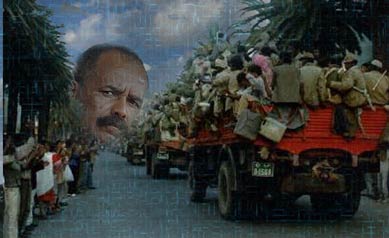A Mafia Group Masquerading as Lawful Government

Twentieth-century world history has recorded the rise and fall of powers that waged devastating regional and global wars to conquer and dominate the world. Their ultimate goal was to affirm their self-proclaimed racial supremacy and/or to plunder the national wealth of other societies. The world had also witnessed political systems that set out to impose their bizarre notion of social order and cultural purity and exterminated millions of their citizens in the name of social transformation and cultural revolution. Further down the atrocity scale, the world continues to host fascist regimes who, corrupted by greed and intoxicated by power, torture and kill thousands of actual and imagined political opponents to achieve total subjugation of their peoples.
Superposed on this history of global tyranny was the emergence in the first half of the century of the criminal underworld, namely mafia organizations (and later drug cartels) that flourished over the years to become a worldwide phenomenon. Mafia enterprises are ruthless and use their power and fearsome reputation for violence to run lucrative operations that rely on such criminal acts as threats and intimidation, assassinations, bribery, tax evasion, money laundering, etc.
Mafia organizations often thrive where the state security system has been rendered ineffective by military/political crisis or been crippled by corruption. But they also operate in stable countries with robust legal and security structures and where law-and-order is firmly in place. Here, mafia enterprises function either at the fringes of the legal system or entirely external to it by setting up front companies to disguise their criminal activities. Even so, they still have to operate under the intrusive eyes of political establishments resolved to combat the threat that these criminal organizations pose to public safety and national interest.
Eritrea’s Double-faced ‘Ruling Entity’
It was against this backdrop of vagaries of history that Eritrea emerged as a nation and ushered in a socio-political phenomenon arguably unlike any other the world has ever witnessed. The PFDJ regime, in power since the nation’s independence in 1991, blended the twin social evils of state tyranny and mafia-style criminality to create a rare and perhaps uniquely brutal ‘political system.’ A key feature of this system is its use of national sovereignty as facade to mask the criminal substructure of a government controlled by a handful of mafia-type power elites.
Structured with such a duality of lawful and criminal attributes, the PFDJ political system has long baffled the world with its belligerence, contempt for international law and propensity for deception. Less known to many, however, are extraterritorial activities that the government runs covertly and which bear all the hallmarks of classic mafia operations. But unlike traditional mafia organizations, the regime runs its criminal activities cloaked in its “sovereign government” status, facilitated by its diplomatic missions and covertly managed by high ranking government and party officials.
Eritrean opposition groups have documented multiple cases of exiled dissidents that were murdered by the party-state over the last quarter century. There were also events in 2016 that offered the world a glimpse into the system’s widespread criminal activities. Regime-sponsored threats, intimidation and extortion typical of its broader overseas operations were exposed in court proceedings in the Netherlands. These events prompted policy decisions and legal measures aimed at putting an end to such acts in the country. Citing the Dutch experience and noting similar cases in neighboring countries, the EU Parliament subsequently passed a resolution condemning the regime’s actions. It also urged member states to investigate the activities of Eritrean embassies and PFDJ affiliates in their jurisdictions. Few months thereafter, the UNHRC accused the regime of committing crimes against humanity on its own population.
A Clandestine ‘National’ Economy
More revealing of the mafia-like qualities of the PFDJ party-state, however, is the nature of the financial and economic systems that it has put in place at home and abroad. Much of the available information on the regime’s offshore economy was compiled by the Somalia-Eritrea Monitoring Group (SEMG).[1] The SEMG is a UN panel mandated to monitor compliance with the provisions of Security Council resolutions that have imposed sanctions on both countries. In their annual reports,[2] the Group refer to the Eritrean government’s domestic and offshore economic structures as ‘formal’ and ‘informal’ economy, respectively. In reality, however, the two economies are intrinsically similar: Both are wholly or largely illicit, lack transparency and accountability and share a blurred distinction between state and party roles in their management.
- a) Formal Economy: Eritrea’s so-called formal economy is a controlled economy of the worst kind and one that is avowedly anti-private sector. Its structural and operational frameworks bear no resemblance to those of national economies anywhere in the world. Ascribing wicked intentions to the principle of international cooperation and waving a fake “self-reliance” banner, the regime fosters a hostile investment climate which has spurned foreign direct investment. (As noted below, the mining sector is a not-so-curious exception to this!) Domestic investment has likewise been squeezed out by gruesome and corrupt licensing process, overly restrictive import and money-transfer regulations and outright government interference in business operations.
PFDJ has a near-monopoly on almost every sector of the economy. Its Economic Affairs Department owns and manages a slew of companies that operate with little or no regulatory oversight. Banking and currency exchange are the exclusive domain of the government and the party. Yet, the party runs black market, currency-trading and money-transfer businesses to generate hard currency for an economy starved of investment and reeling from a negative balance of trade. The construction and transport sectors too are the monopoly of party-owned companies which, though plagued by inefficiency and corruption, face little competition.
Import businesses are dominated by PFDJ corporations which engage in contraband trade and profit from an intricate web of fraudulent import-handling arrangements hardly concealed from regulatory agencies. These fixes enable them to avoid import duties (on goods for domestic market) and export duties (on “transit” commodities smuggled into the Sudan). Another cross-border operation of the mafia enterprise is run by senior military officers who routinely transport arms and refugees from Eritrea through the Sudan to destinations in Egypt and the Sinai via a smuggling-trafficking ring they have established in those countries. [3] The proceeds from this operation and laundered money from contraband trade are managed in much the same way as PFDJ’s much larger offshore financial assets (see below).
- b) Informal Economy: The Eritrean party-state also runs an informal economy which is sustained by an “extensive, offshore and largely illicit financial apparatus controlled and operated by intelligence, military and party officials many of them operating in an ‘unofficial’ capacity.”[5] This vast and complex economy “is managed almost entirely offshore through a labyrinthine multinational network of companies, individuals and bank accounts, many of which do not declare any affiliation to PFDJ or the Eritrean State, and routinely engage in ‘grey’ or illicit activities.”[6]
Ultimate authority over the informal economy, which involves a much higher proportion of hard currency transactions than the ‘formal’ one, rests with the Economic Affairs Department of the PFDJ. The department controls a number of foreign companies, overseas business partnerships, hard currency deposits, offshore bank accounts (directly). Also it manages importation of commodities, transfer of hard currency remittances, collection of diaspora taxes/contributions and revenues of PFDJ-controlled enterprises (through party agents and diplomatic missions).
Each year, hundreds of millions of dollars are generated globally from these sources and activities. Some of these revenues are moved through embassy-held accounts at banks in the U.S. and European countries; others are routed through various opaque money-transfer arrangements. All are eventually channelled to a consulate-controlled account with HSBC in Dubai, U.A.E. — a major hub for PFDJ offshore financial networks. It is known that PFDJ representatives at the consulate tap into some of these funds to pay for a wide range of imports and to finance the regime’s covert operations in the region.[7]
The Grim Realities of PFDJ’s Eritrea
Any task of scrutinizing the essence of the PFDJ party-state or appraising its virtues need not venture beyond a quick glance at its governance record and its stature on the world stage. At home it has rejected constitutionalism, judicial independence and separation of powers; instead, it opted to rule by presidential decree. Internationally, it has earned itself the dubious distinction of being one of the most accused, condemned and sanctioned regimes in the world today – a testament to its tyrannical and belligerent qualities.
A few factual observations suffice to illustrate the brutality of PFDJ’s tyrannical rule: Hounded by a government bent on enforcing indefinite conscription and forced labor in the name of ‘national service,’ 5,000 young people flee the country each month. The regime maintains more than 300 prisons around the country, and over 10,000 dissidents and prisoners of conscience remain locked up in its dungeons. These are confounding statistics for a nation with a population of just 4.5 million.
The regime has run the country’s private sector into the ground. Eritrean towns and cities have become symbols of stagnation and decay, and the once-thriving national economy has been ruined to the level of rural economy in a middle-income country. GDP shrunk at an average rate of -0.9% during the period 2000-2009.[8] The rate increased (at least on paper) to about 3-4% for the four years that followed the commissioning of the Bisha mine in early 2011.[9] That an annual mining revenue of a paltry $200 million could cause such a big jump in GDP is indicative of a lethargic economy. The increase itself is more apparent than real since mining revenues never reach the national treasury, but are diverted to offshore bank accounts of the mafia entity.
A Nation Held Captive by Mafiocracy
Eritrea’s experience of the last quarter century has made one thing abundantly clear: The PFDJ party-state is a mafiocracy whose raison d’être is amassing wealth and limitless power for the clique that controls it. Its design for the country is not one of fostering international cooperation, foreign investment and trade as a way to build a prosperous, stable nation at peace with itself and with its neighbors. Its leaders have no wish to uphold the rule of law and to respect the human/civil rights of “their own” people. Neither do they have the rectitude to let citizens contribute to their nation’s socioeconomic development and share in the returns therefrom.
Intent on controlling the population, the regime impoverished rural and urban communities alike, nurtured fear of external threats and cast a wide net of mass surveillance in the country. But these control measures alone could not satisfy its leaders who saw militarization of society as essential to ensuring total subjugation of the population. To this end, they put the country on an interminable war footing and obligated all able-bodied citizens to be under arms in the military, the ‘national service’ program or the people’s militia.
The suffering and indignity engendered by these cruel measures have stoked popular anger and resentment which continue to spur the youth to abandon the country in droves. Nevertheless, the PFDJ elite remain unfazed by the exodus: They are acutely aware that these aggravated young bloods are a ticking bomb and, should they stay in the country, would one day spark a mass uprising capable of sweeping away the tyrannical order. It is therefore no surprise that the mafia enterprise is a primary promoter of the exodus. Designated military commanders routinely facilitate the flight of young people from the country and their onward travel to far-off destinations for a fee of thousands of dollars per head.[10] On the other hand, those who cannot afford the social and financial cost of fleeing the country face no better fate than a brutal life of servitude.
To the PFDJ mafia group, Eritrea is not a people deserving of liberty, justice, dignity and decent living. It is simply a territory whose sovereignty affords a shield from criminal liability and a sort of “command-and-control-bunker” from which to run an international mafia enterprise. Condemned to a life of servitude and gripped by poverty, fear and uncertainty, the population sadly finds itself coerced into protecting the crime bosses, their hideouts and the nerve center of their international criminal operations – all under the guise of ‘defending the motherland!’
Conclusion
Any reasonable person would agree SEMG’s authentic account of Eritrea’s clandestine financial and economic systems does portray a stark picture of the disturbing realities in the country. Strange as it is, the “national wealth” or “national economy” that pundits ascribe to Eritrea does not belong to the crisis-ridden nation and its destitute population. The PFDJ mafia enterprise has designated itself the sole proprietor of that wealth! Eritrea’s ruling clique presides over the intricate, illicit offshore operations of the enterprise to create wealth for itself; and it has made sure that revenues so generated are stashed away in Swiss banks. The enterprise preys even on revenues from the country’s only export (of precious and base metals) which it channels into its hideaway bank accounts abroad. All the while, the PFDJ regime continues to erect endless political and socioeconomic impediments that have systematically decimated the ability of the country and its people to create wealth.
The absolute power the regime wields in the country is thus rooted in the system of clandestine economic structures that its mafia enterprise has instituted outside the country. It is financial resources from these external sources that sustain the regime’s socioeconomic agenda of limiting livelihoods to subsistence levels for the bulk of the population. The same resources support the state security apparatus that imposes ubiquitous surveillance on the population. In other words, the power that the regime uses to control and subjugate the Eritrean people through the instruments of fear and destitution is derived from outside the country. Therefore, opposition groups and the diaspora movement in general will do well to recognize this truth and reset their political strategy accordingly. The battle of undermining the regime’s external power base, hence loosening the stranglehold of its security police on the population must certainly be fought outside the country.
References
[1]-[2] https://www.un.org/sc/suborg/en/sanctions/751/work-and-mandate/reports
[3]-[10] http://www.un.org/ga/search/view_doc.asp?symbol=S/2011/433




Awate Forum